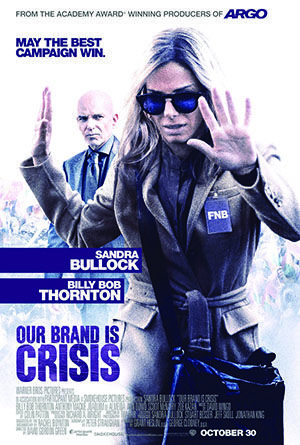An unstable mix of cynicism and simplistic idealism corrodes the entertainment value of the loosely fact-based political comedy, “Our Brand Is Crisis” (Warner Bros.).
The film presents a fictionalized — and satiric — version of events surrounding the 2002 presidential election in Bolivia. Unbeknown to most Americans, that race was certainly affected, and perhaps tilted, by the involvement of skilled spin doctors imported from the United States.
One such image-maker is Jane Bodine (Sandra Bullock). Her volatile personality and distinctly mixed record of results have earned her the unenviable nickname “Calamity Jane.”
A duo of fellow operatives invite Jane to join them on the campaign staff of former Bolivian president Castillo.
Currently a senator, Castillo is out to recapture the presidency despite the bloody street violence that marred his first tenure — and that continues to make him highly unpopular.
Though largely indifferent toward the outcome, Jane has a personal reason for reentering the fray. Castillo’s opponent is being supported by another American consultant, Pat Candy (Billy Bob Thornton), with whom Jane has a bitter, long-running rivalry.
Yet the fate of the populous, at least in the short term, is at stake, as the film dutifully reminds us. Not only does this spoil what might, in the abstract, be considered the “fun” of Jane’s story, it also introduces real-world political values that will not sit well with all viewers.
Thus brutality and betrayal are shown to be the tactics of the right, while a thirst for justice, so the story implies, will only be satisfied by a countervailing triumph of the left. In reality, Gonzalo Sanchez de Lozada, for whom Castillo serves as a stand-in, was succeeded in 2006 by socialist stalwart Evo Morales.
As for the film’s appropriate audience, interludes of sleazy wordplay and bawdy visual humor make it fit for grownups only.
At any rate, the amusement that might be derived from the movie’s free-for-all jockeying loses out to the picture’s real — and rather tiresome — purpose, which is to reinforce Hollywood’s uncritical acclaim of leftist policies at home and abroad.
The film contains brief rear nudity, occasional sexual references, about a half-dozen uses of profanity, frequent rough and crude language and a couple of obscene gestures. (A-III, R).

